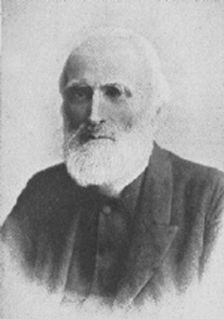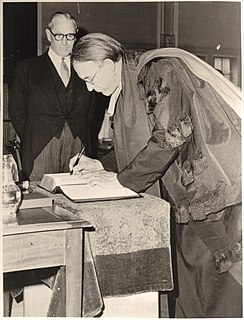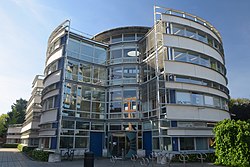
Fenton John Anthony Hort (1828–1892), known as F. J. A. Hort, was an Irish-born theologian and editor, with Brooke Foss Westcott of a critical edition of The New Testament in the Original Greek.

Brooke Foss Westcott was an English bishop, biblical scholar and theologian, serving as Bishop of Durham from 1890 until his death. He is perhaps most known for co-editing The New Testament in the Original Greek in 1881. He was an enthusiastic supporter of the British Empire.

The Lady Margaret's Professor of Divinity is the oldest professorship at the University of Cambridge. It was founded initially as a readership by Lady Margaret Beaufort, mother of King Henry VII, in 1502. Since its re-endowment at the end of the 20th century, it is now specifically a chair in New Testament and early Christian studies.
Regius Professorship of History is one of the senior chairs in history at the University of Cambridge. It was founded in 1724 by George I as the Regius Professorship of Modern History.
The Regius Professorships of Divinity are amongst the oldest professorships at the University of Oxford and the University of Cambridge. A third chair existed for a period at Trinity College, Dublin.
The Knightbridge Professorship of Philosophy is the senior professorship in philosophy at the University of Cambridge. There have been 22 Knightbridge professors, the incumbent being Rae Langton.
The Norris–Hulse Professorship of Divinity is one of the senior professorships in divinity at the University of Cambridge.

The Faculty of Law, Cambridge is the law school of the University of Cambridge.
John Hulse was an English clergyman. He is now known mainly as the founder of the series of Hulsean Lectures at the University of Cambridge.

The Ascension Parish Burial Ground, formerly known as the burial ground for the parish of St Giles and St Peter's, is a cemetery off Huntingdon Road in Cambridge, England. Many notable University of Cambridge academics are buried there, including three Nobel Prize winners.
The Regius Professor of History at the University of Oxford is a long-established professorial position. Holders of the title have often been medieval historians. The first appointment was made in 1724. The term "Regius" reflects the origins of the post as a royal appointment, itself a recognition of the important influence of history.

The Hulsean Lectures were established from an endowment made by John Hulse to the University of Cambridge in 1790. At present, they consist of a series of four to eight lectures given by a university graduate on some branch of Christian theology.
The Oxford Faculty of Theology and Religion co-ordinates the teaching of theology at the University of Oxford, England. It is part of Oxford's Humanities Division.

Charles Francis Digby "Charlie" Moule, known professionally as C. F. D. Moule, was an English Anglican priest and theologian. He was a leading scholar of the New Testament and was Lady Margaret's Professor of Divinity at the University of Cambridge for 25 years, from 1951 to 1976.
David Alexander Syme Fergusson is a Scottish theologian, Presbyterian minister, and academic. Since 2021, he has been Regius Professor of Divinity at the University of Cambridge.

The position of Dean Ireland's Professor of the Exegesis of Holy Scripture was established at the University of Oxford in 1847. This professorship in the critical interpretation or explanation of biblical texts, a field known as exegesis, was instituted by John Ireland, who was Dean of Westminster from 1816 until his death in 1842. He founded scholarships in his lifetime at the University of Oxford, which are still awarded after an examination to undergraduates "for the promotion of classical learning and taste". In his will, he left £10,000 to the university, with the interest arising to be applied to the professorship. The first professor, Edward Hawkins, was appointed in 1847. The second Dean Ireland's Professor, Robert Scott, had won an Ireland scholarship in 1833 while studying at Christ Church.
Frederick John Foakes Jackson was a Church historian. For thirty-four years he taught at Jesus College, Cambridge, serving as dean from 1895 to 1916. Then, at the age of 61, he became the Briggs Professor of Christian Institutions at Union Theological Seminary, New York City, finally becoming emeritus in 1933. He is probably best known for the massive five volume work The Beginnings of Christianity—an edition, translation, commentary, and study of the Acts of Apostles—that he conceived and edited with Kirsopp Lake.

The Faculty of Classics is one of the constituent departments of the University of Cambridge. It teaches the Classical Tripos. The Faculty is divided into five caucuses ; literature, ancient philosophy, ancient history, Classical art and archaeology, linguistics, and interdisciplinary studies.
Peter Runham Ackroyd was a British Biblical scholar, Anglican priest, and former Congregational minister. From 1961 to 1982, he was the Samuel Davidson Professor of Old Testament Studies at the University of London. He was also President of the Society for Old Testament Study in 1972.
Stanley Lawrence Greenslade, FBA was an English theologian, ecclesiastical historian and clergyman. He held the Regius Professorship of Ecclesiastical History at the University of Oxford from 1959 to 1972.














